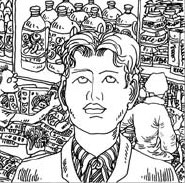
A young colleague of mine finds her anger rising while covering the latest developments in the baby formula scandal, which now involves 22 producers. She keeps asking, "Where are the ethics in the bottom line?"
Three babies have died and some 6,200 more are suffering from kidney stones after taking low-priced Sanlu and 21 other brands of infant formula. The parents believed they had selected the best product they could afford to supplement mother's milk.
Even today, advertisements for Sanlu claim that it is "state of the art" and meets the standards of the United Nations Food and Agriculture Organization and the World Health Organization. According to the ads, the producers meet babies' "needs for special nutrients" by selecting "excellent quality milk" and adding "multiple nutrients essential for infants' growth".
In fact, the formula was contaminated with melamine, a chemical that makes milk appear rich in protein. The parents have no knowledge that the use of melamine is banned in food processing. What can someone who adds such a substance to baby formula be thinking? Or, as my young friend keeps asking, "Where are ethics in the bottom line?"
In business, the "bottom line" is generally considered to be the profit after all expenses and taxes have been paid. Such non-economic factors as ethics, product safety, and the public good don't enter into it.
It is no wonder that for centuries, business people have been considered cunning, deceitful or even dishonest, because the bottom line was all about making the money.
Into this category fall the people now detained or arrested on charges of deliberately adding melamine to fresh raw milk. One trader confessed that he was told only melamine could get rid of the "strange odor" of the milk from his 100-odd dairy cows. Otherwise, he couldn't have sold the milk to Sanlu.
It is ironic that modernization and globalization have made business people seem more glamorous. Making money is considered "glorious". "What is 'glorious' about dead babies?" we must ask.

Consumers in China and elsewhere understand that ethics are sometimes lost in the bottom line. In 1990, American scholar Larry L Axline reported on a survey by the Dallas Times Herald which showed that "75 percent of all respondents believed businesspeople would bend the rules to achieve success. Sixty-eight percent of businesspeople said there were unethical practices in their industries".
When businesses ignore ethics, the cost is huge. In his blog, the ethics officer of a major public relations company, highlights the fact that the WorldCom scandal led to "the loss of 17,000 jobs and brought a company worth $100 billion to bankruptcy".
More recently, there has been much talk in the West about business ethics, with writers from leading business newspapers suggesting that "there is money to be made in doing good." On Tuesday, the Washington Post reported that George Washington University Business School has started to emphasize ethical business practices and globalization in its graduate courses.
This is old news in New China, where the public good has always come first, at least in theory. The baby formula scam only shows that, even in our country, protecting the public from unscrupulous business practices is a never-ending battle.
We must not allow ourselves to indulge in complacency after the success of our earthquake relief efforts, the Beijing Olympics, and the Paralympics. The baby formula scandal should force us to work harder at including ethics in the bottom line, not only in business but in every corner of society.
E-mail: lixing@chinadaily.com.cn
(China Daily 09/18/2008 page8)

